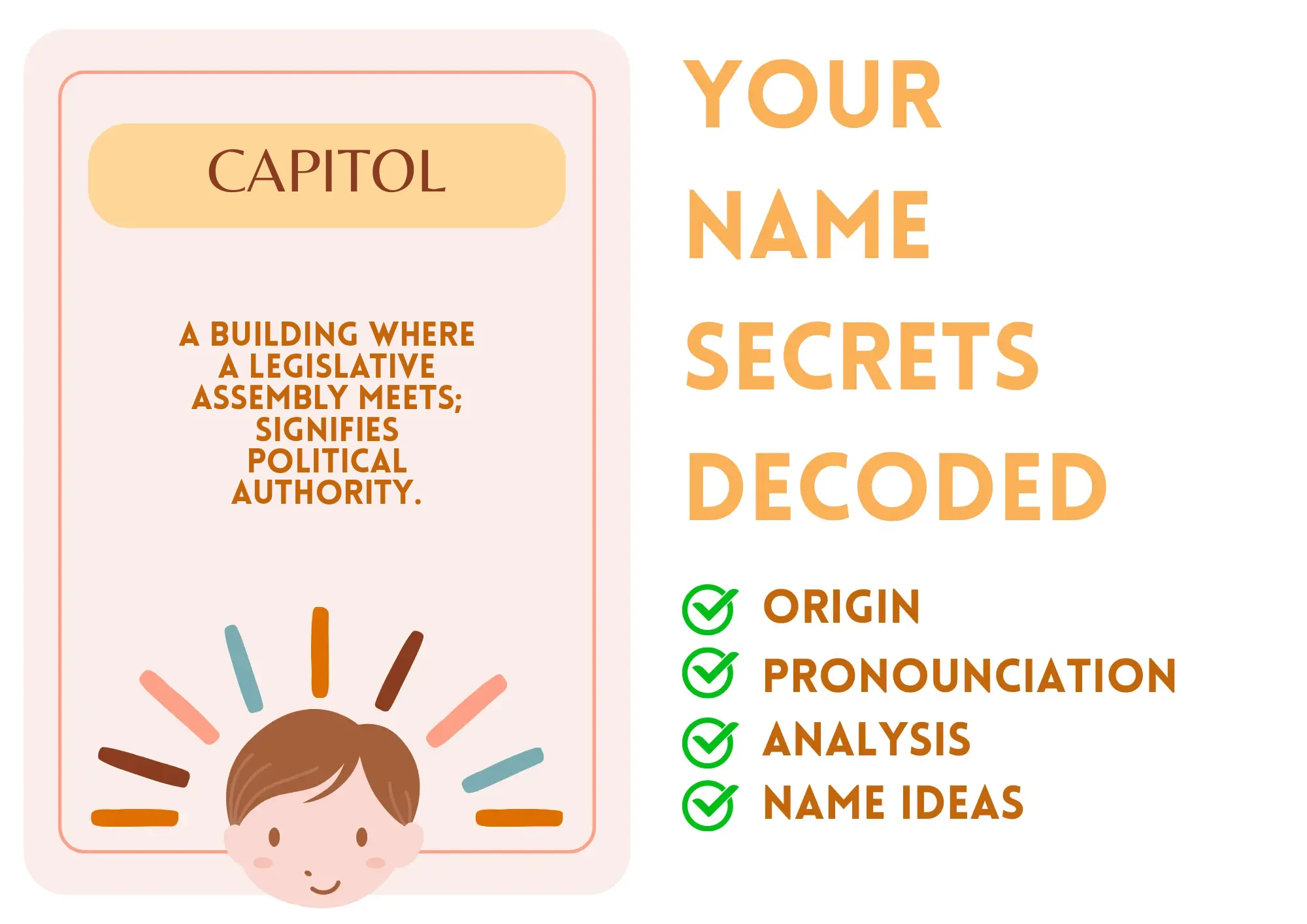
Capitol
Capitol is an intriguing name derived from the Latin word 'Capitolinus', connecting deeply with concepts of governance and historical significance. While traditionally associated with structures or places (such as the U.S. Capitol), it can also serve as a unique and strong name, primarily given to males. Its roots are grounded in significant civic architecture, symbolizing authority and democracy.
People associate 'Capitol' with strength, leadership, and political significance. While it is unconventional as a personal name, it is not difficult to pronounce or write, fostering a unique identity for those who bear it.
Capitol finds echoes in popular culture, where it resonates with themes of leadership in politics, thus becoming a conversation starter. This name is often appreciated for its uniqueness and powerful undertones associated with governance and structure.
Basic Information
Gender: Boy
Sounds Like: KAP-i-tuhl
Pronunciation Explanation: The first syllable 'CAP' is stressed, followed by a quick 'i' sound and ending with 'tuhl'.
Summary and Meaning
Meaning: A building where a legislative assembly meets; signifies political authority.
Origin: The name Capitol originates from Latin, specifically the term 'Capitolinus', referring to the Capitoline Hill in Rome where important governmental affairs were conducted.
Usage: Capitol is traditionally masculine but can be used for any gender, leaning towards the unisex due to its architectural meaning.
Name Number (Chaldean)
Name Number (Pythagorean)
Popularity (Global Rank)
Overall: 85066
Boys:
Most Popular in
Religious and Cultural Significance
Religion: Secular
Background: Although not religious, the name Capitol is intertwined with concepts of governance and public service, representing a civic duty.
Cultural Significance: The Capitol denotes symbols of democracy and governance, playing a crucial role in many cultures that embody democratic values.
Historical Significance: The Capitol Building in Washington, D.C. has profound historical significance as the seat of the United States Congress, symbolizing democracy, power, and American history.
Popular Culture
Literature and Mythology: Capitol is mentioned in various literature discussing governance and societal structures, symbolizing authority.
Movies and Television: In films and series, elements like 'The Capitol' often evoke themes of power, decisions, and political drama, adding depth to storylines.
Feelings and Perceptions
Perception: The name Capitol evokes images of strength and authority but can be seen as too elaborate or formal by some. It is perceived as unique and carries a certain weight.
Positive Feelings: Strong, authoritative, prestigious, distinctive.
Negative Feelings: May seem unusual as a personal name, lacks warmth or familiarity, could be perceived as overly formal.
Practical Considerations
Ease of Writing and Calling: Capitol is simple to write and pronounce but might require clarification when introduced as a name due to its strong associations with governmental buildings.
Common Typos and Misspellings: Capitol,Capital,Capitoll,Capitol
Common Nicknames: Cappy,Cap
Capitol Popularity
Capitol Usage and Popularity By Country
| Country | Rank (Overall) |
|---|---|
| Lebanon | 8817 |
| Philippines | 11950 |
| Turkey | 28343 |
| Sri Lanka | 29200 |
| United States | 30786 |
| New Zealand | 33723 |
| Saudi Arabia | 40278 |
| Canada | 46968 |
| United Kingdom | 64637 |
| United Arab Emirates | 67985 |
Capitol Usage and Popularity By City
| City | Rank (Overall) |
|---|---|
| Washington | 10081 |
| Sacramento | 3639 |
| New York | 32506 |
| Baltimore | 8173 |
| Olympia | 1063 |
| Johannesburg | 36487 |
| Fairfield | 1744 |
| Seattle | 17340 |
| Richmond | 7986 |
| Bengaluru | 34802 |
Compatibility Analysis
Famous Persons Named Capitol
No results found for Capitol.
Related Names
Similar Sounding Names:
Caspian,Carter,Callum,Caleb